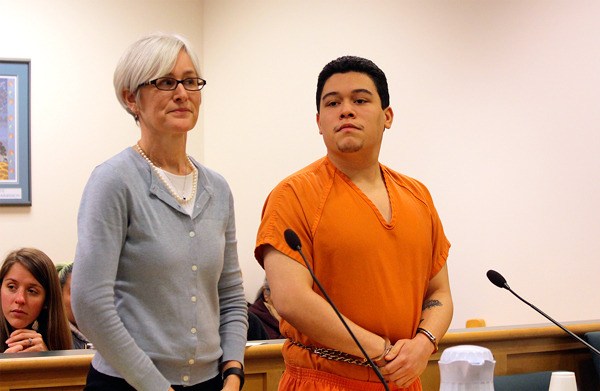The central witness in a murder that happened in a sleepy Oak Harbor neighborhood in 2014 took the stand Friday and described a harrowing series of events.
Bryce Hill, who was just 17 when the murder occurred, testified that one of his friends pulled a gun on the other.
Hill said he feared for his life as the friend — whom he described as the shooter — returned home with him, still armed.
He again feared for his life as rumors swirled around town and on social media that he had committed the murder.
Both Hill and his father testified about a traumatic encounter with police, who surrounded their truck with guns drawn, roughly pulled the teen from the vehicle, accused him of being armed and — for one tense moment — mistook his father’s flashlight for a gun.
Hill was not a suspect in the murder at the time but became a key witness — even though he risked being charged with a drug crime by being honest with police.
“He told me I needed to do the right thing,” said Hill, referring to his father. “I disappointed him too many times in my life so I decided I needed to do the thing I needed to do.”
In court Friday, Hill reluctantly pointed at his former friend, Christopher Malaga, 24, on trial in the shooting death of Adam Garcia, 21, in the early morning of Oct. 18, 2014.
The trial started Tuesday and is scheduled for three weeks.
The prosecution and defense laid out their cases during opening statements.
Island County Prosecutor Greg Banks argued that Malaga shot Garcia because he was upset that he kicked him out of the Garcia home just hours earlier; Malaga was staying in a shed on the property off and on for months.
Garcia repeatedly apologized, but it didn’t pacify Malaga, Banks claimed.
“This is a case about injured pride,” Banks said, “and how the defendant, Mr. Malaga, sought to heal his injured pride by putting a bullet in Mr. Garcia.”
Banks explained that Garcia was at a party on the night of Oct. 17 and a group of people decided they wanted to get cocaine. Garcia contacted Hill, who offered to sell him a small amount. Garcia and Christopher Knowles, another party attendee, set up a meeting with Hill at about 3 a.m. on Southwest Castillian Drive.
Banks said Hill brought along Malaga, who was staying at his home after being kicked out of Garcia’s place. After the exchange of drugs for money, Malaga pulled out his handgun and pointed it at Garcia.
After words were exchanged, Malaga shot him in the face, Banks claimed.
Malaga’s defense attorney, Jennifer Bouwens, focused on early confusion over the shooter’s identity. Knowles initially described the shooter as a “short, fat Asian” whose name was either “Nico” or “Nikki.”
Knowles picked another man out of a photo line-up, saying he was “85 to 90 percent sure” he was the right man, she said.
Bouwens said police have no physical evidence linking Malaga to the murder. She argued that prosecution won’t prove the case beyond a reasonable doubt.
“We submit that, after all the evidence is presented, you will still not know” who killed Garcia, she said.
Emotions ran high both on the stand and in the gallery. The woman who drove Garcia and Knowles to the scene wept while testifying, as did Garcia’s mother. One of Garcia’s family members broke down when an image of Garcia’s body was shown.
Bryce Hill’s father, Gerald Hill, took the stand before his son. He testified about seeing Malaga on the morning of the murder and driving him to Bellingham, where Malaga was involved with a recording studio. Malaga, Bryce Hill and other friends were aspiring musicians.
Gerald Hill made it clear that he was still upset about the manner in which the police pulled over his truck and took his son into custody. He said the officers “rushed” the vehicles with guns drawn.
Under cross examination, he said that, as an African-American, he’s aware of issues surrounding how police treat certain minorities.
He testified that police officers opened a passenger door, pulled his son out of the car and yelled at the teenager, accusing him of having a gun. He said he tried to get out of the truck but a deputy, who was pointing a gun at him, wouldn’t let him. He testified that one of the officers apparently mistook a flashlight for a gun and yelled out, “He’s got a gun” as he reached to find a cell phone.
Gerald Hill said he was also afraid for his son’s life.
“When they snatched him out of the truck,” he said, “what was really graphic to me was how close that guy had his gun to my son’s face.”
Fortunately, he said, the situation de-escalated. Officers handcuffed Bryce Hill and brought him to the police station, where Gerald Hill followed and asked his son to tell the truth about what happened.
In court, Gerald Hill became emotional as he explained why he asked his son to help the police, even though the young man was disgruntled about his alleged mistreatment at their hands.
“If you think about it,” he said, “if it was my son who got killed, I would want someone to share that.”



